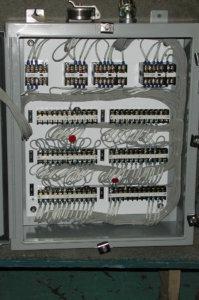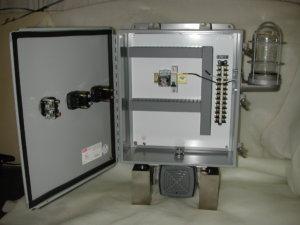An enclosure or electrical box is a protective case designed to protect individuals from making accidental contact with the equipment while protecting sensitive components, such as cable connections and wiring.
Making sure the junction box meets all National Electrical Manufacturers Association (NEMA) and IP ratings will ensure it’s durable and robust enough for indoor and outdoor applications.
Because there are several types of electrical enclosures, Temp-Pro has created a comprehensive industrial enclosures selection guide. Learn more about the different types of electrical enclosures as well as how to choose an electrical enclosure for different industrial applications.
Understanding the Types of Electrical Enclosures
When discussing the different types of electrical enclosures, the majority of people are referring to the assembly’s NEMA enclosure rating. This rating is designed to make it easier for engineers to select an electrical enclosure with more confidence in its ability to perform in a specific environment. Let’s take a closer look at the different types of electrical enclosures.
Type 1 Enclosure
Designed for indoor use, these types of electrical enclosures offer a degree of protection against incidental contact with the equipment. At the same time, Type 1 enclosures offer protection for the equipment against dirt falling.
Type 2 Enclosures
Designed for indoor use, these types of electrical enclosures protect against incidental contact with the equipment in the enclosure. At the same time, Type 2 enclosures offer protection for the equipment against dirt falling as well as a degree of protection against light splashing and dripping of liquids. NEMA 250-1997.
Type 3 Enclosures
Engineered for both indoor and outdoor use, these types of electrical enclosures offer a degree of protection against incidental contact with the equipment in the enclosure. In addition, Type 3 enclosures offer a degree of protection against falling snow, sleet, rain, dirt and dust blown by wind. This box also works to protect the equipment from the external formation of ice on the enclosure.

Type 3R Enclosures
Type 3R enclosures are almost identical to Type 3 enclosures and offer similar protections. However, Type 3R enclosures do not protect against windblown dust.
Type 35 Enclosures
Type 35 enclosures are engineered for both indoor and outdoor use. These types of electrical enclosures offer a degree of protection against incidental contact with the equipment in the enclosure. In addition, Type 35 enclosures offer a degree of protection against falling snow, sleet, rain, dirt and windblown dust; and in which the external mechanism(s) remain operational when laden with ice.
Type 4 Enclosures
Engineered for both indoor and outdoor use, Type 4 enclosures offer a degree of protection against incidental contact with the equipment in the enclosure. They are designed to provide protection against windblown dust, rain sleet, falling dirt, snow, hose-directed water and splashing water. In addition, Type 4 enclosures are designed to be undamaged by the exterior formation of ice on the enclosure.
Type 4X Enclosures
Type 4X enclosures offer almost identical protections as Type 4. However, Type 4X enclosures also feature a degree of protection against corrosion.
Type 5 Enclosures
Type 5 enclosures are engineered for use indoors and offer a degree of protection for personnel against incidental contact with the equipment enclosed. These enclosures offer a degree of protection against falling dirt as well as settling airborne lint, dust, fillings and fibers. Type 5 enclosures also provide a level of protection against light splashing and dripping of liquids.
Type 6 Enclosures
Engineered for both indoor and outdoor use, these types of electrical enclosures offer a degree of protection against incidental contact with the equipment in the enclosure. Type 6 enclosures offer a degree of protection against hose-directed water, falling dirt and water entering the assembly in the event of temporary and occasional submersion at a limited depth. In addition, Type 6 enclosures are designed to be undamaged by the exterior formation of ice on the enclosure.
Type 6P Enclosures
Type 6P enclosures offer almost identical protections as Type 6. While Type 6 enclosures offer protection against water entering the assembly in the event of temporary and occasional submersion at a limited depth; Type 6P enclosures can protect against the entry of water during prolonged submersion at a limited depth.
Type 12 Enclosures
Type 12 enclosures are engineered exclusively for use indoors. These types of enclosures offer a degree of protection for personnel against incidental contact with the equipment enclosed in the box. They provide protection against falling dirt as well as circulating fibers, lint, dust and fillings. In addition, Type 12 enclosures offer protection against light splashing and dripping of liquids.
Type 13 Enclosures
Type 13 enclosures are designed for indoor use and will offer a degree of protection against incidental contact with the equipment enclosed in the box. These types of electrical enclosures provide a degree of protection against dirt falling as well as circulating fibers, lint, dust and fillings. Type 13 enclosures also boast the ability to protect against the splashing, spraying and seeping of oil, water and other types of non-corrosive coolants.
What Are the Key Differences Between Electrical Enclosures vs Junction Boxes?
While there are several differences between junction boxes and enclosures, the most significant one is size. Junction boxes are typically smaller, while electrical enclosures can be relatively large.
Another key difference between junction boxes and electrical enclosures is that junction boxes are offered with translucent covers, which means you can easily see what’s inside.
How to Choose an Electrical Enclosure?
When it comes to choosing the best electrical enclosure for your application, you’re not alone! You have access to decades of experience and expertise at Temp-Pro. At Temp-Pro, we are the leading provider of all types of electrical enclosures. We combine unwavering quality with class-leading functionality to deliver excellent value in all of our enclosures. Whether you’re looking for a simple industrial junction box or a fully manufactured electrical enclosure, Temp-Pro offers the expertise to guide you to the best solution.
Key Takeaways
- An enclosure or electrical box is designed to protect people from making accidental contact with the equipment while protecting the equipment and wiring from environmental hazards.
- There are a number of different types of electrical enclosures.
- The NEMA enclosure rating is designed to help engineers to select an electrical enclosure with more confidence in its ability to perform in a specific environment.
- One of the most significant differences between electrical enclosures and junction boxes is size.
- When it comes to choosing the best electrical enclosure for your application, the team at Temp-Pro offers tailored assistance and expert guidance.
Contact Temp-Pro for Electrical Enclosures for Industrial Applications
At Temp-Pro, we offer all types of electrical enclosures, ranging from junction boxes to large multi-component, walk-in control panels used in power plants and more. Contact Temp-Pro today for electrical enclosure assistance.




